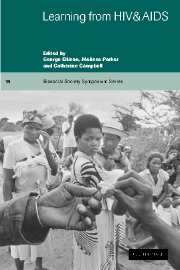Book contents
- Frontmatter
- Contents
- List of contributors
- Foreword by D. Clarke-Patel
- 1 Introduction. Learning from HIV and AIDS: from multidisciplinary to interdisciplinarity
- 2 HIV and the evolution of infectious diseases
- 3 The epidemiology of HIV/AIDS: contributions to infectious disease epidemiology
- 4 The influence of HIV/AIDS on demography and demographic research
- 5 What have clinicians learnt from working with HIV/AIDS? A medical perspective from London
- 6 How has the HIV/AIDS pandemic contributed to our understanding of behaviour change and health promotion?
- 7 Anthropological reflections on HIV prevention strategies: the case for targeting London's backrooms
- 8 An absence of anthropology: critical reflections on anthropology and AIDS policy and practice in Africa
- 9 A disaster with no name: the HIV/AIDS pandemic and the limits of governance
- 10 Postscript: reflections on HIV/AIDS and history
- Country index
- Subject index
- References
Foreword by D. Clarke-Patel
Published online by Cambridge University Press: 14 January 2010
- Frontmatter
- Contents
- List of contributors
- Foreword by D. Clarke-Patel
- 1 Introduction. Learning from HIV and AIDS: from multidisciplinary to interdisciplinarity
- 2 HIV and the evolution of infectious diseases
- 3 The epidemiology of HIV/AIDS: contributions to infectious disease epidemiology
- 4 The influence of HIV/AIDS on demography and demographic research
- 5 What have clinicians learnt from working with HIV/AIDS? A medical perspective from London
- 6 How has the HIV/AIDS pandemic contributed to our understanding of behaviour change and health promotion?
- 7 Anthropological reflections on HIV prevention strategies: the case for targeting London's backrooms
- 8 An absence of anthropology: critical reflections on anthropology and AIDS policy and practice in Africa
- 9 A disaster with no name: the HIV/AIDS pandemic and the limits of governance
- 10 Postscript: reflections on HIV/AIDS and history
- Country index
- Subject index
- References
Summary
If men could learn from history, what lessons it might teach us! But party and passion blind our eyes, and the light which experience gives is a lantern on the stern, which shines on the waves behind us!
Samuel Taylor Coleridge, Table TalkLearning from HIV and AIDS is proving every bit as problematic as Coleridge characterised history as a teacher. HIV of course poses its own particular challenges. National responses have had to address a disease that is primarily spread by unprotected sex, around which open discussion is often clouded by prejudice, denial, ignorance and misconception. These have all facilitated the spread of HIV/AIDS, and impeded the pace of national political responses. Approaches to HIV/AIDS which seek to promote learning relevant to policy responses for prevention, care and impact, are therefore urgently required at national, regional and global levels. This volume is a valuable contribution to that agenda.
As the new millennium unfolds, the HIV/AIDS pandemic continues to spread apace in many parts of the world. These are generally the places that can least afford the increased burdens of suffering and deprivation the disease brings about, and those that typically lack the capacities required to mount an effective prevention and care response. The poverty-reduction development prospects of much of Eastern and Southern Africa are seriously challenged by a high prevalence of HIV in the general population – threatening hard won gains in: human development; life expectancy; and education. Meanwhile, HIV continues to spread in West Africa.
- Type
- Chapter
- Information
- Learning from HIV and AIDS , pp. xi - xviiiPublisher: Cambridge University PressPrint publication year: 2003

